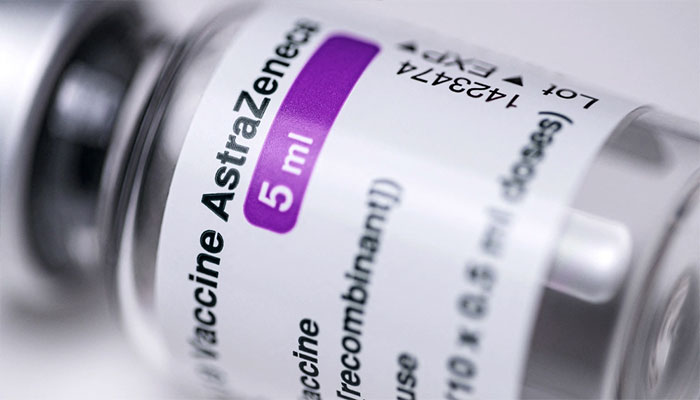Thai provinces fear coronavirus surge: Sicilians reject AstraZeneca vaccine
ROME: Up to 80 percent of people offered the AstraZeneca Covid-19 vaccine in Sicily refuse it out of fears over its safety, according to the southern Italian region’s president Nello Musumeci.
Public confidence in the Anglo-Swedish jab has been badly shaken by reports linking it to rare, but potentially fatal, blood clots, and by conflicting recommendations on its use. "In Sicily, there is an 80-percent refusal rate of the AstraZeneca vaccine. Every 100 people, 80 say no," Musumeci said late on Saturday in Catania, according to multiple media reports.
Musumeci added: "It is natural" for people to be particularly concerned, "but we have a duty to believe scientists when they say it is more dangerous not to get vaccinated than to get vaccinated."
The president actually meant to say "up to 80 percent," his spokeswoman Michela Giuffrida told AFP on Sunday, adding, as an example, that in the town of Syracuse the refusal rate was "30 percent".
A large-scale boycott of the AstraZeneca jab would put Italy’s vaccination plan -- already struggling with supply shortages and botched priorities -- under further stress.
Earlier this week, the European Medicine Agency (EMA) said blood clots should be listed as a "very rare" side effect of the AstraZeneca vaccine, but added that benefits continued to outweigh risks.
The announcement came after EMA examined 86 blood clotting cases, 18 of which were fatal, out of around 25 million people in Europe who received the AstraZeneca vaccine. Most of the cases were in women aged under 60.
In response to the findings, Italy -- which initially recommended the AstraZeneca vaccine for those in the 18-55 age group -- restricted its use to those aged 60 and above. Similar action was taken in other European countries.
On Friday, the EU medicines regulator also said it was probing a possible link between the AstraZeneca jab and a separate blood vessel disorder causing tissue swelling and a drop in blood pressure.
But the Italian government’s top scientific advisor on the coronavirus crisis, Franco Locatelli, insisted in a Sunday interview that fears over the Anglo-Swedish vaccine were "understandable, but unjustified".
"I say that we are offering a vaccine that is safe and effective, which people must accept. That said, if we find ourselves facing a disarming number of defections, we will reconsider the issue," he told La Stampa daily.
Italy is one of the countries worst hit by the pandemic, with almost 114,000 dead, but its vaccination drive has been criticised for failing to focus on the most at-risk group -- the elderly.
Meanwhile, almost 40 Thai provinces have brought in entry restrictions and quarantine requirements for people coming from Bangkok and other coronavirus hotspots ahead of a holiday travel period, as the capital grapples with soaring infections.
On Sunday the government announced 967 new infections, bringing the overall tally to more than 32,000. Separately, health officials in the northern city of Chiang Mai flagged a further 281 cases, that were likely to be included in Monday’s national figures.
Bangkok appears to be the epicentre of Thailand’s third wave, with more than 1,000 cases reported this month. More than 4,000 people are in hospital with coronavirus across the country.
Bangkok has set up 10 field hospitals to accommodate up to 3,000 patients for Thailand’s "most severe outbreak", according to Suksan Kittisupakorn, director-general of the Medical Service Department.
Thai authorities have detected a highly infectious variant of the virus originally found in Britain. Festivities for the rowdy Songkran holiday marking the Thai new year, known for its public water fights, have been curtailed, with officials cancelling Bangkok street celebrations to discourage crowds.
In a related development, the number of Covid-19 patients under 40 in intensive care in Brazil surpassed older groups last month, a researcher said Sunday, amid a deadly surge driven partly by a new coronavirus variant.
The number of people aged 39 or younger in intensive care units with Covid-19 in March rose sharply to more than 11,000, or 52.2 percent of the total, said the Brazilian ICU Project. That was up from 14.6 percent of total ICU patients early in the pandemic and around 45 percent from September through February.
"Previously, this was a population that would typically only develop a less-severe form of the disease and would not need intensive care. So the increase for this age group is very significant," said Dr. Ederlon Rezende, co-coordinator of the project, an initiative of the Brazilian Association of Intensive Medicine (AMIB).
He said various factors could be driving the increase. Patients over 80, who fell from 13.6 percent to 7.8 percent of the total in Brazil’s ICUs in March, are now largely vaccinated.
Young people are also more likely to expose themselves to the virus, whether because they have to leave home to work or believe they are less vulnerable, he said.
-
 Kate Gosselin Reveals Horrowing Moment Thief Nearly Took Her Down
Kate Gosselin Reveals Horrowing Moment Thief Nearly Took Her Down -
 Billy Bob Thornton Weighs In On Contrast To 'Landman' Role
Billy Bob Thornton Weighs In On Contrast To 'Landman' Role -
 Amanda Holden May Swap Position To Different Reality Show: See Which
Amanda Holden May Swap Position To Different Reality Show: See Which -
 The Truth Behind Victoria Beckham's 'inappropriate' Wedding Dance Video
The Truth Behind Victoria Beckham's 'inappropriate' Wedding Dance Video -
 AI Startup Raises $480 Million At $4.5 Billion Valuation In Earlier Gains
AI Startup Raises $480 Million At $4.5 Billion Valuation In Earlier Gains -
 North Carolina Woman Accused Of Serving Victims With Poisoned Drinks
North Carolina Woman Accused Of Serving Victims With Poisoned Drinks -
 Robert Redford’s Daughter Amy Sings Praises Of Late Father
Robert Redford’s Daughter Amy Sings Praises Of Late Father -
 OpenAI And ServiceNow Team Up To Embed ChatGPT In Business Workflows
OpenAI And ServiceNow Team Up To Embed ChatGPT In Business Workflows -
 Johnny Depp Prepares For His Massive Comeback After Years Of Struggle
Johnny Depp Prepares For His Massive Comeback After Years Of Struggle -
 Meghan Markle Is Ready To Put A Cork In It All By Giving Prince Harry Baby No. 3: ‘She Wants A Break’
Meghan Markle Is Ready To Put A Cork In It All By Giving Prince Harry Baby No. 3: ‘She Wants A Break’ -
 Billie Eilish Speaks Out Against Authority: 'It's Very Strange'
Billie Eilish Speaks Out Against Authority: 'It's Very Strange' -
 'Greenland Will Stay Greenland', Former Trump Adviser Hints At New Twist
'Greenland Will Stay Greenland', Former Trump Adviser Hints At New Twist -
 Brooklyn Beckham's Wedding Dance With Mom Victoria Sparks Hilarious Memes
Brooklyn Beckham's Wedding Dance With Mom Victoria Sparks Hilarious Memes -
 King Charles' Latest Photos A Statement On His Health?
King Charles' Latest Photos A Statement On His Health? -
 Tom Cruise's Biggest Dream Crushed By The President?
Tom Cruise's Biggest Dream Crushed By The President? -
 King Charles, Queen Camilla Send Message To King Of Spain After Train Crash
King Charles, Queen Camilla Send Message To King Of Spain After Train Crash




